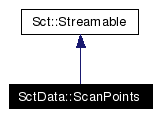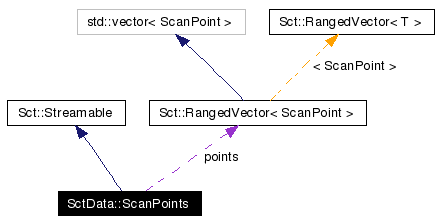
#include <ScanPoints.h>
Inheritance diagram for SctData::ScanPoints:


Public Member Functions | |
| ScanPoints (const unsigned nPoints, const float *points, const unsigned *nEvents, const unsigned *nErrorEvents) throw () | |
| Create a ScanPoints from data that is already known. | |
| ScanPoints () throw () | |
| Create an empty ScanPoints. | |
| virtual | ~ScanPoints () throw () |
| Virtual destructor. | |
| unsigned | getNPoints () const throw () |
| Get the number of scan points. | |
| double | getPoint (const unsigned i) const throw (LogicError) |
| Get the value of the variable at a point. | |
| double | operator[] (const unsigned i) const throw (LogicError) |
| Returns getPoint(i). | |
| double & | operator[] (const unsigned i) throw (LogicError) |
| Returns an l-value which is the value of the variable at a point,. | |
| unsigned | getNEvents (const unsigned i) const throw (LogicError) |
| Get the number of events (triggers) at a point. | |
| unsigned | getNErrorEvents (const unsigned i) const throw (LogicError) |
| Get the number of error events at a point. | |
| void | addPoint (const double point, const unsigned nEvents, const unsigned nErrorEvents) throw () |
| Add a new point. Takes the variable value, number of events and number of error events. | |
| double * | getEdgesAscending () const throw (LogicError) |
| Returns an array that contains bin lower edges for this ScanPoints in ascending order. | |
| double | getMin () const |
| smallest value | |
| double | getMax () const |
| largest value | |
| bool | ascending () const |
| Returns true if sorted ascending, false if sorted descending,. | |
| void | setAxis (TAxis &axis) const throw (LogicError) |
| Set a ROOT TAxis to the values in this ScanPoints. | |
| virtual string | getClassName () const throw () |
| override | |
Private Attributes | |
| Sct::RangedVector< ScanPoint > | points |
| vector of ScanPoint. | |
Data Structures | |
| class | ScanPoint |
| internal class holds data, one per point More... | |
It contains methods to get the number of events, the number of error events and the variable value for each point. There are also some utility methods to get "bin" values for use in setting histogram axes and to set a TAxis directly.
Definition at line 25 of file ScanPoints.h.
|
||||||||||||||||||||
|
Create a ScanPoints from data that is already known.
Definition at line 11 of file ScanPoints.cpp. |
|
|
Create an empty ScanPoints.
Definition at line 18 of file ScanPoints.cpp. |
|
|
Virtual destructor.
Definition at line 43 of file ScanPoints.h. |
|
||||||||||||||||
|
Add a new point. Takes the variable value, number of events and number of error events.
Definition at line 48 of file ScanPoints.cpp. Referenced by SctTest::HighLevelApi::publishScan(), and SctData::IO::ScanPointsStreamer_v1::read(). |
|
|
Returns true if sorted ascending, false if sorted descending,.
Definition at line 60 of file ScanPoints.cpp. References getNPoints(), and getPoint(). Referenced by SctAnalysis::RxThresholdAlgorithm::analyze(), SctAnalysis::RxDelayAlgorithm::analyze(), getEdgesAscending(), getMax(), getMin(), SctData::IO::RawScanResultStreamer_v3::readSliceData(), SctData::IO::RawScanResultStreamer_v2::readSliceData(), and SctData::IO::RawScanResultStreamer_v1::readSliceData(). Here is the call graph for this function:  |
|
|
override
Implements Sct::Streamable. Definition at line 20 of file ScanPoints.cpp. |
|
|
Returns an array that contains bin lower edges for this ScanPoints in ascending order. Can be used for setting axes.
Definition at line 81 of file ScanPoints.cpp. References ascending(), and points. Referenced by SctData::IO::RawScanResultStreamer_v3::setHistSize(), SctData::IO::RawScanResultStreamer_v2::setHistSize(), and SctData::IO::RawScanResultStreamer_v1::setHistSize(). Here is the call graph for this function:  |
|
|
largest value
Definition at line 56 of file ScanPoints.cpp. References ascending(), getNPoints(), and getPoint(). Here is the call graph for this function:  |
|
|
smallest value
Definition at line 52 of file ScanPoints.cpp. References ascending(), getNPoints(), and getPoint(). Here is the call graph for this function:  |
|
|
Get the number of error events at a point.
Definition at line 44 of file ScanPoints.cpp. Referenced by SctData::IO::ScanPointsStreamer_v1::write(). |
|
|
Get the number of events (triggers) at a point.
Definition at line 40 of file ScanPoints.cpp. Referenced by SctAnalysis::TxCurrentAlgorithm::analyze(), SctAnalysis::RxThresholdBasedOnConfigRegisterAlgorithm::analyze(), SctAnalysis::AnalysisAlgorithm::checkForZeroTriggerBins(), and SctData::IO::ScanPointsStreamer_v1::write(). |
|
|
|
Get the value of the variable at a point.
Definition at line 28 of file ScanPoints.cpp. Referenced by SctAnalysis::TxCurrentAlgorithm::analyze(), SctAnalysis::RxThresholdBasedOnConfigRegisterAlgorithm::analyze(), ascending(), getMax(), and getMin(). |
|
|
Returns an l-value which is the value of the variable at a point,.
Definition at line 36 of file ScanPoints.cpp. |
|
|
Returns getPoint(i).
Definition at line 32 of file ScanPoints.cpp. |
|
|
Set a ROOT TAxis to the values in this ScanPoints.
Definition at line 102 of file ScanPoints.cpp. |
|
|
vector of ScanPoint.
Definition at line 108 of file ScanPoints.h. Referenced by getEdgesAscending(), and getNPoints(). |
 1.4.6
1.4.6